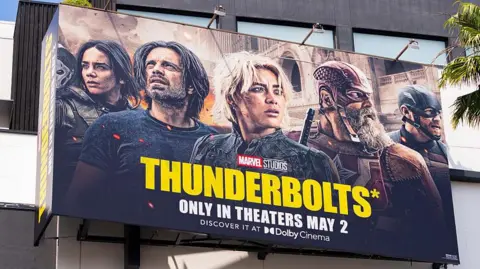What impact might Trump’s Hollywood tariffs have elsewhere?
Emma Saunders
Culture reporter

 Getty Images
Getty Images
US President Donald Trump has said he will hit movies made in foreign countries with 100% tariffs, as he ramps up trade disputes with nations around the world.
Trump said in a post on Truth Social that he was authorising the US Department of Commerce and Trade Representative to start the process to impose the levy because America’s movie industry was dying “a very fast death”.
So what might this mean for both the US film industry and the global movie business including the UK?
Is Hollywood ‘dying’?
Announcing the new tariffs, Trump declared that Hollywood was “dying”. So is it?
It’s true that the industry has been through a really rough time in recent years.
The pandemic saw production close down and the impact is ongoing.
Hollywood studios spent $11.3 billion on productions in the second quarter of 2024, a 20% drop from the same period in 2022, as studios continued to cut costs in an attempt to recover from Covid losses.
Any shoots of recovery were then severely stifled by the 2023 actors and writers strikes.
Then the wildfires struck earlier this year.
And for several years now, more and more people – not just youngsters – have been turning to YouTube and other streaming platforms for content.
The US remains a major film production hub and according to Variety, 2025 has seen a rebound in box office numbers since last year, with overall domestic revenues up 15.8% on 2024 so far.
New Marvel superhero film Thunderbolts topped the North American box office this weekend, raking in an estimated $76 million, marking a promising start to the summer season.
But Hollywood is definitely still up against it.
What is Trump proposing?
The president says he wants to “immediately begin the process of instituting a 100% tariff on any and all movies coming into our country that are produced in foreign lands. We want movies made in America again!”
This has led to questions about whether the tariffs would also apply to American film companies producing films abroad.
Several recent major movies produced by US studios were shot outside America, including Deadpool & Wolverine, Wicked and Gladiator II. Hit franchises like Mission Impossible also shoot overseas.
We also don’t yet know if the tariffs will be applied retrospectively.
Trump later told reporters that “other nations have been stealing the movies and movie-making capabilities from the United States”, which may suggest he was only referring to non-US films. We’ll have to wait for more detail.
What incentives do other countries offer?

 Getty Images
Getty Images
Many countries offer tax breaks to encourage film production such as New Zealand, Australia and the UK and that’s something Trump wants to take on.
But it’s not the only reason a US film company might wish to film abroad.
Some choose to do so for the specific location, exotic and exciting backdrops for example. Who could forget Tom Cruise’s ascent of the Burj Khalifa, Dubai, in Mission: Impossible – Ghost Protocol?
What could it mean for the next James Bond movie, a franchise now owned by US giant Amazon but based on an iconic British character who works for MI6, based in London?
And it’s not just other countries that offer incentives – other US states are luring film production away from Hollywood.
Georgia, Illinois and Kentucky are among the many other US states which California are now competing with.
Gavin Newsom, California’s governor, who Trump described as “grossly incompetent” when speaking about the movie tariffs on Monday, is currently pushing for his plan to more than double the state’s film and TV tax incentives to $750 million annually.
While Newsom has made no comment yet on Trump’s proposal, his senior communications advisor told Deadline: “We believe he has no authority to impose tariffs under the International Economic Emergency Powers Act, since tariffs are not listed as a remedy under that law.”
How would the tariffs actually work?
There are more questions than answers at this stage.
The World Trade Organization (WTO) has a moratorium on tariffs for digital goods until 2026. Presumably films count as digital goods.
And what would they base the tariffs on? Box office revenue or production costs? Is streaming content included? That would have a huge impact on US companies like Netflix. What about post-production ie editing?
Tim Richards, Vue Entertainment CEO and founder, Radio 4 Today’s programme: “A big part of this is what constitutes US film – is it where the money comes from, the script, the director, the talent, where it was shot?”
And how do you even classify a foreign film when so many are co-productions and are often shot in multiple countries?
Trump appeared to be talking about film and not TV but it’s not 100% clear at this stage. Would tariffs apply to films made for streaming or just cinema releases? We’ll have to wait for more detail. And of course, Trump may rollback on the proposals as he has done with some other tariffs.
What could it mean for other countries?

 PA Media
PA Media
Obviously, putting a 100% tariff on foreign films means a huge cost increase for those production companies who want to sell to the US market.
Commenting on Trump’s announcement, the UK government’s Culture Media and Sport Committee chair Dame Caroline Dinenage MP said: “Last month the Culture, Media and Sport Committee warned against complacency on our status as the Hollywood of Europe. President Trump’s announcement has made that warning all too real.
“Making it more difficult to make films in the UK is not in the interests of American businesses. Their investment in facilities and talent in the UK, based on US-owned IP, is showing fantastic returns on both sides of the Atlantic. Ministers must urgently prioritise this as part of the trade negotiations currently under way.”
Head of media and entertainment trade union Bectu in the UK, Philippa Childs, said in a statement: “These tariffs, coming after Covid and the recent slowdown, could deal a knock-out blow to an industry that is only just recovering and will be really worrying news for tens of thousands of skilled freelancers who make films in the UK.”
The governments of Australia and New Zealand have spoken out in support of their countries’ film industries.
“Nobody should be under any doubt that we will be standing up unequivocally for the rights of the Australian screen industry,” Australia’s home affairs minister Tony Burke said.
New Zealand’s Prime Minister Christopher Luxon told a news conference that his government was awaiting further details of the proposed tariffs.
“But we’ll be obviously a great advocate, great champion of that sector and that industry,” he added.
And with the Cannes film festival just around the corner, uncertainty hangs in the air with many US film producers looking to sell foreign distribution rights.
Could tariffs work?
Tariffs could incentivise US film companies to make more films on home soil but the risk is that if it’s more expensive than to do so abroad, some films just won’t get made. More incentives or rebates could help offset this but we just don’t know at this stage if that’s under discussion on a national scale.
NPR Radio film critic Eric Deggans warned that the tariffs, should they be introduced, could further harm the industry.
Other countries may respond by placing tariffs on American films, he told the BBC, making it “harder for these films to make profits overseas”.
“It may create a situation where the tariffs in America are causing more harm than good,” he added.







